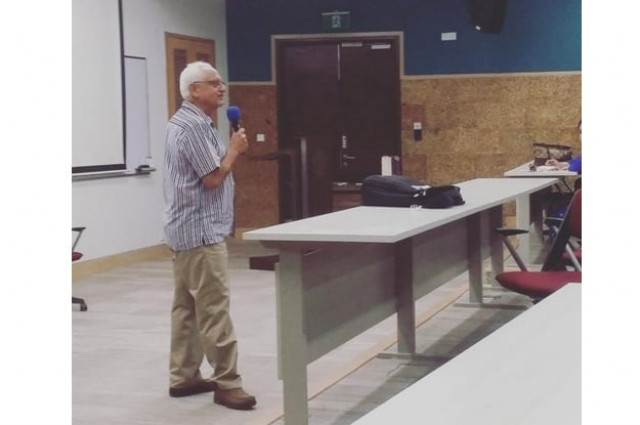For the people, by the people
Nepalese journalist discusses his country's new constitution and its merits

Nepalese journalist discusses his country's new constitution and its merits. PHOTO: twitter.com/habibuniversity
A pioneer in the field of South Asian journalism, Kanak Mani Dixit, in his lecture on Thursday, said that the Indian fuel and economic blockade of Nepal was a tactic to pressuriase Nepalese politicians, after the failure of Modi's government to persuade the politicians of Kathmandu to amend Nepal's constitution to make it more pro-India.
Nepal adopts new constitution amid protests
Dixit was speaking about 'Nepal's Search for Constitutional Stability' at Habib University. His talk revolved around the history and demographics of the politics of Nepal. He also highlighted the phases through which this constitution was passed and came into effect. He termed Nepal as a country of mixed communities, comprising a five to six per cent Muslim population.
Speaking about what makes Nepal's constitution unique, Dixit explained that the constitution has been written keeping in mind the demands and expectation of the people living in Nepal, particularly those who are able to raise their voices for their rights.
"In most de-colonised countries, constitutions were written by the elite who had the same values and thinking as the colonisers, but the constitution of Nepal is written according to the demands of its people," explained Dixit. He said that unlike other South Asian countries, Nepal was never officially colonised and hence it never adopted its own constitution.
Nepal police firing kills five protesters
On the rights guaranteed to the people of Nepal, he said the constitution is a democratic one and it guarantees due rights to women, children, and people of different races. It guarantees 33 per cent representation of women in the assembly and 43 per cent in local bodies, he said. Dixit added that the new constitution has taken the term of 'province and provincial government' from Pakistan, instead of taking the term of 'state' from India.

"National, provincial, and village [local government] level government will now be practiced in Nepal," Dixit said.
Political awareness
Dixit was of the view that the Nepali people were aware of daily news. He considered this awareness one of the reasons for the constitution of Nepal being so democratic; because a large number of people were aware of their democratic rights. He felt that a strong and independent media and education sector were the factors that drove the people to demand their rights.
Nepal's first foreign photo festival opens in shadow of quake
Indian Pressure
Dixit criticised the Modi government for interfering in the politics of Nepal. He said India should end its differences with Nepal, because Nepal is now a sovereign and secular country and outside powers should refrain from dictating to it.
Political agitation of Madhesis
Madhesis, a minority group in Nepal, are not happy with the constitution, he claimed. They live close to the India-Nepal border and usually marry Indians. Under the constitution, children born to a Nepali who is married to a foreigner are considered ineligible for full citizenship rights. But, Dixit said, the constitution is still open for amendments and the demands and rights of this minority group can still be added to the constitution.
Shedding light on the importance of the constitution of Nepal in his concluding remarks, Dixit said that although the constitution is not an ideal one, it should still be celebrated.
Published in The Express Tribune, November 7th, 2015.



















COMMENTS
Comments are moderated and generally will be posted if they are on-topic and not abusive.
For more information, please see our Comments FAQ